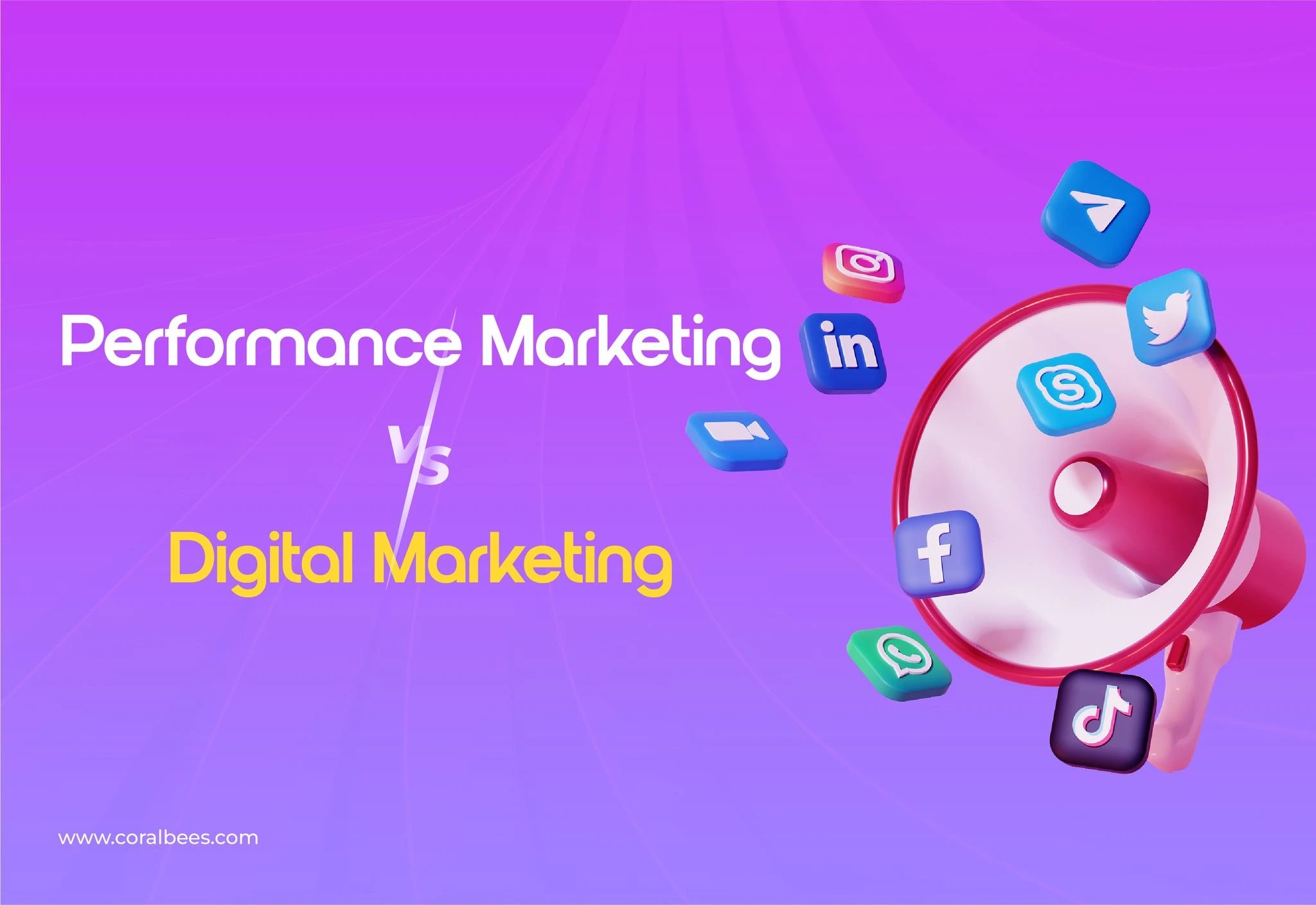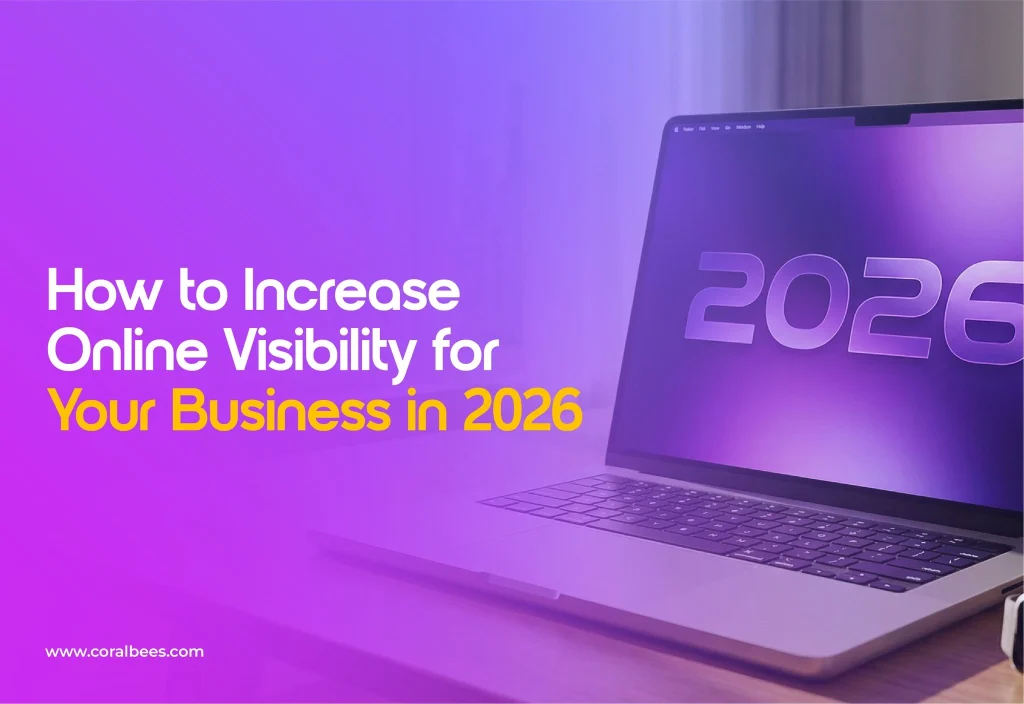Performance Marketing vs Digital Marketing has become a widely discussed topic among modern marketers. Especially for brands striving to maximize ROI and optimize every campaign, it is essential to proceed knowing their differences and scope. While both aim to grow a brand and drive conversions, their approaches, goals, and metrics aren’t the same. Understanding these contrasts can help businesses choose the right marketing strategy for sustainable growth as per their goals.
What is Digital Marketing?
Digital marketing refers to the promotion of products or services through online platforms like search engines, websites, social media, and email. The purpose of digital marketing is to help businesses build a strong brand presence, reach a wider audience, and get long-term visibility. Some of its components are search engine optimization (SEO), content marketing, social media marketing, email marketing, and search engine marketing (SEM).
Startups today understand why digital marketing is important for small businesses. The main goal is to engage the target audience, create awareness, and nurture potential customers through valuable content. By improving organic reach and audience connection, digital marketing nurtures lasting relationships that drive consistent growth. With the help of a reputed digital agency, brands can effectively apply these strategies to leverage digital channels, improve online visibility, boost website traffic, and strengthen brand reputation.
What is Performance Marketing?
Businesses need to understand what is performance marketing in digital marketing, as it plays a key role in driving growth. It is one of the Recent Trends in Digital Marketing, known for its results-driven approach focused on measurable outcomes. It emphasizes actions like clicks, leads, or sales generated through campaigns. Performance marketing meaning in simple terms, revolves around paying for achieved results rather than potential exposure.
It involves targeted strategies such as pay-per-click (PPC) advertising, affiliate marketing, remarketing, and social media ads. Marketers can track every click, conversion, and click-through rate (CTR) to gauge success. Since payments are tied to performance, this method ensures efficient use of marketing budgets. When businesses aim to grow quickly with quantifiable results, the best digital marketing agency can design effective performance campaigns for them, aligning specific ROI goals.
Key Differences Between Digital Marketing and Performance Marketing
A comparison of performance marketing vs digital marketing shows clear variations in their goals and methods, though both overlap in techniques and platforms. Digital marketing aims to strengthen brand presence and engagement across online channels. Performance marketing, on the other hand, focuses on direct, result-based outcomes. Understanding these distinctions helps businesses plan campaigns that balance visibility with measurable performance.
Marketing Approach
Digital marketing focuses on long-term and broader brand awareness and audience engagement. The objective is to build brand trust and create lasting customer relationships. However, performance marketing metrics apply a targeted marketing approach that revolves around conversion-oriented campaigns. Every tactic, ad, and post is optimized for measurable outcomes, such as cost per acquisition or sales volume.
Metrics and Measurement
Engagement metrics are the fundamental parameters of digital marketing success, including impressions, reach, and audience growth. These indicate how well a brand connects with its target audience. In performance marketing, the focal points are metrics like conversion rate, ROI, and CTR. Here, businesses evaluate success based on actions completed, providing a clear picture of investment efficiency.
For a broader understanding of upcoming market shifts, brands can explore the Digital Marketing Challenges to Watch in 2026, as competition continues to intensify.
Types of Performance Marketing Strategies
Performance marketing relies on continuous analysis and optimization, ensuring each campaign delivers measurable outcomes. It uses several result-driven tactics designed to boost conversions and track ROI effectively. Each of these strategies relies heavily on accurate tracking and reporting, enabling marketers to refine campaigns quickly.
- Pay-Per-Click (PPC) Advertising: Advertisers pay when users click on their ads. Platforms like Google Ads or Meta Ads are common examples.
- Affiliate Marketing: Partners promote products on their platforms and earn commissions for sales generated.
- Native Advertising: Ads appear as natural content on relevant websites, offering better engagement.
- Social Media Ads: Paid promotions on Facebook, Instagram, or LinkedIn help drive quick conversions.
- Retargeting Campaigns: These ads target users who previously interacted with your brand but didn’t complete an action.

Types of Digital Marketing Strategies
Digital marketing strategies focus on building brand visibility, engagement, and long-term audience trust. Recent trends in digital marketing show how innovative methods are reshaping the way businesses connect with their audiences. Each type of marketing strategy strengthens a business’s online presence and helps attract loyal customers over time.
- Content Marketing: Creating valuable blogs, videos, and visuals that engage the audience and build trust.
- Search Engine Optimization (SEO): Improving website ranking on Google to increase organic visibility.
- Social Media Marketing: Connecting with audiences through engaging posts, reels, and stories.
- Email Marketing: Personalized messages designed to retain customers and encourage repeat engagement.
- Influencer Marketing: Partnering with social media influencers to enhance credibility and reach
When to Use Digital Marketing vs Performance Marketing
Performance marketing vs digital marketing is often a puzzle for businesses, creating confusion about which approach is right. If a business is aiming to enhance brand identity, thought leadership, and seeking consistent visibility across platforms with long-term brand building and engagement, it is ideal to invest in digital marketing. This way, they can educate their audience, nurturing trust and supporting sustained audience growth.
For brands looking for immediate, measurable results, performance marketing suits their short-term goals. The areas it helps include lead generation, app downloads, product launches, short-term campaigns, and e-commerce sales. It allows precise ROI evaluation through transparent metrics and real-time performance insights.
Small startups with limited budgets often prefer performance marketing initially, while established brands typically combine it with broader digital strategies to maintain a competitive edge. However, a combination of both performance marketing and digital marketing can assist startups in creating recognition and driving fast revenue.
Combining Digital and Performance Marketing for Maximum ROI
Although distinct in marketing strategy examples, both digital marketing and performance marketing can complement each other effectively. Integrating these tactics will deliver stronger outcomes for businesses of all scales. Digital marketing generates awareness and engagement, builds the foundation of trust and awareness. Nevertheless, performance marketing converts that attention into measurable results by maximizing conversion opportunities.
For example, effective content marketing and social media marketing can attract organic visitors, and follow-up PPC or retargeting campaigns can convert them into paying customers. This synergy enhances Return on Investment (ROI), ensuring that every marketing effort supports both short-term performance and long-term sustainability.
To effectively apply this strategy, collaborating with the best digital marketing agency is crucial, as it helps businesses plan, execute, and optimize such hybrid campaigns efficiently.
FAQ
- What is performance marketing in digital marketing?
It’s a results-based marketing strategy, meaning advertisers pay only when defined actions like clicks, leads, or sales occur. - How is performance marketing different from digital marketing?
Digital marketing builds brand awareness and long-term relationships, while performance marketing emphasizes immediate, trackable results. - Which marketing strategy is better for startups?
Performance marketing suits startups that need quick conversions and transparent ROI tracking. - How do you measure ROI in performance marketing?
Metrics such as CTR, conversion rate, and cost per lead are used to evaluate campaign success. - Can digital marketing and performance marketing be used together?
Yes. The combination ensures both strong brand presence and measurable campaign performance for consistent growth.








